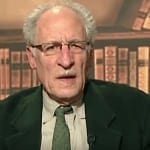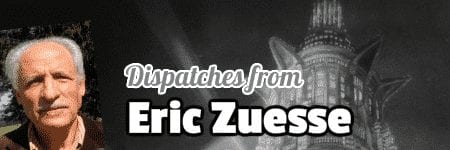‘Russiagate’ Is Actually Israelgate — Trump as Agent of Israel, Not of Russia
The way that Mueller’s investigation, to find reasons for Trump’s impeachment, achieved on December 1st the indictment and plea-deal with Flynn, was to get Flynn to admit (after his first having lied to deny) that he had been asked by Trump’s son-in-law Jared Kushner, who had been asked by Israel’s head-of-state Benjamin Netanyahu, to communicate to Russia’s head-of-state Vladimir Putin through Russia’s U.S. Ambassador, a request on behalf of the incoming U.S. Administration of Donald Trump, for Russia to get Israel out of a jam at the U.N. Security Council. Netanyahu didn’t want to be alone in trying to pressure Putin to turn against the Palestinians; he wanted the incoming Trump Administration also to be pressuring Putin to do that — for Russia to veto, this time, a resolution (#2334 in 2016), which, every year in the past, had been supported by Russia; or, failing to achieve that, to get Russia’s support for Israel’s effort to delay the Security Council’s vote, until after Trump would become installed as the U.S. President on January 20th. That’s what Putin was saying no to. The initiative in this matter — the matter that has oddly become the centerpiece of Mueller’s case for impeaching Trump — came from Israel’s head-of-state, Benjamin Netanyahu, not at all from Russia’s head-of-state, Vladimir Putin, such as is almost universally reported to have been the Trump Administration’s foreign master (if any). Trump’s agent, Kushner, was the supplicant, on behalf of Israel, for Putin’s assistance to Israel. Kushner had been asked by Netanyahu to do this, and Kushner assigned Flynn to do it, on behalf of Trump. According to ABC News, “Trump phoned Flynn shortly after the election to explicitly ask him to ‘serve as point person on Russia,’ and to reach out personally to Russian officials to develop strategies to jointly combat ISIS.” But, apparently, Flynn accepted Kushner’s instructions also (not only Trump’s), and he assumed that what Kushner wanted here (which was not against ISIS, but instead against the Palestinians) was also what Trump wanted on this matter. In fact, Eli Lake reported about Flynn, on the day of Flynn’s indictment, December 1st, “that during the last days of the Obama administration, the retired general was instructed to contact foreign ambassadors and foreign ministers of countries on the U.N. Security Council, ahead of a vote condemning Israeli settlements. Flynn was told to try to get them to delay that vote until after Barack Obama had left office, or oppose the resolution altogether.” This was being done for Netanyahu, not for Putin. As the New York Timesreported this, “Mr. Flynn asked Russia to intervene at the United Nations on behalf of Israel.” Furthermore, Putin’s answer to Kushner’s request for Russia to veto or at least delay the “United Nations Security Council resolution condemning Israel for its settlement policy” was the exact opposite of what Netanyahu-Kushner were requesting: Russia voted in favor of the resolution, not weakened it — much less vetoed it, as Netanyahu-Kushner were urging. In other words: Russia refused to comply with the incoming U.S. President’s son-in-law’s request that had been passed to Putin through Russia’s U.S. Ambassador Sergey Kislyak, through Flynn, through Kushner, who had received the request directly from Netanyahu (and the indictment makes no allegation that President-Elect Trump even so much as knew about any of this; there is no impeachable allegation made there against Trump). Possibly, but not yet certainly, Kushner had received, from his father-in-law, instructions to comply with Israel’s ‘requests’, so that Kushner didn’t need to communicate with Mr. Trump specifically for permission to pass along to Putin through Russia’s U.S. Ambassador, Netanyahu’s desire, as being also America’s desire. Not only was Trump not Putin’s agent in this matter, but his son-in-law was instead serving there as Netanyahu’s agent, under some as-yet-undetermined authorization from Trump, but the indictment doesn’t even allege there to have been any such authorization, by Trump, at all. We can be certain that Kushner did have Trump’s authorization, however, in some form, because even now, Trump hasn’t yet fired Kushner. Kushner’s incompetence might bring down Trump, but Trump still stands with Kushner, against Mueller, even though that seems politically suicidal for Trump to be doing. No doubt, if Trump were to break from Kushner, then Kushner might testify against Trump — and so that path (Trump’s turning against Kushner) would also be politically suicidal for Trump. Perhaps Kushner will go to prison if he becomes prosecuted and doesn’t reach any plea-deal. Maybe that’s the reason why Trump doesn’t fire Kushner. The plea-deal with Flynn has him admitting that his contacts with Kislyak were authorized only by Kushner (referred to in Flynn’s indictment not by name but only by the vague phrase “a very senior member of the Presidential Transition Team”). However, Flynn had earlier lied to the FBI and said that he “never asked Russia’s ambassador to Washington, Sergey Kislyak, to delay the vote for the U.N. Security Council resolution.” So: if, subsequently, it somehow does turn out to be Flynn’s word against Trump’s word, then the ultimate decision will be made by Senate Republicans when they either do or don’t vote for Mike Pence to take over the remainder of Trump’s term. In order for that switch to be made, two-thirds of the entire U.S. Senate — that’s 67 of the 100 — would need to vote for Pence to take over. Whereas Democrats seem eager for Pence to complete Trump’s term, that’s only 46 Senators, or 48 if both Independents vote with the Democrats, and at least 9 or 11 of the Senate’s 52 Republicans would then also need to vote for Pence. The Vice President would not be the presiding officer; instead, the Constitution makes the Chief Justice of the U.S. that, and only the Senators are allowed to be counted in a Senate trial that would follow after the House’s majority-vote for a Senate trial to be held. The V.P. couldn’t serve as any ‘tie-breaker’ in this trial. And removal-from-office would be the only direct harm to Trump; the U.S. provides no way to try the President on any charge via the courts — the only way a U.S. President can be punished for any crime is by being tried, and then convicted and removed from office, by a two-thirds vote in the Senate. Other than that, a U.S. President is above the law. The Flynn indictment does make one other allegation which specifically concerns Russia: “FLYNN falsely stated that he did not ask Russia’s Ambassador to the United States … to refrain from escalating the situation in response to sanctions that the United States had imposed against Russia.” Flynn admitted now that that was a lie — that he had made this request of Kislyak. On December 5th, Max Blumenthal aptly headlined, “Michael Flynn’s Indictment Exposes Trump Team’s Collusion With Israel, Not Russia — But you wouldn’t know it from reading most mainstream coverage of the revealing affair,” and he commented: “While the Israel lobby ran interference for Kushner, the favorite pundits of the liberal anti-Trump ‘Resistance’ minimized the role of Israel in the Flynn saga. MSNBC’s Rachel Maddow, who has devotedmore content this year to Russia than to any other topic, appeared to entirely avoid the issue of Kushner’s collusion with Israel.” Apparently, exposing Israeli control over the U.S. Government is, in effect, prohibited; only Russian ‘control’ over us may be ‘exposed’. The very possibility, that when America’s taxpayers pay (via U.S. taxes) annual donations of $3.8 billion per year to the Government of Israel, which is a ‘friend’, instead of a master — an enemy — of the American people, seems to be prohibited to disprove, or even to question publicly. But there it is, and Russia gets the blame, which Israel (and the Sauds) do not. Such misdirection of the blame could cause WW III, especially if U.S. media continue calling this ‘evidence’ ‘against Trump’, by such terms as ‘Russiagate.’ It’s not that, at all; and portraying it as if it were, could do the whole world a whole lot of harm. (I don’t say this in support of Trump, a President I loathe as much as I do his far slicker predecessor, but instead to expose the current lynch-mob as being what they actually are: psychopathic inciters of the most horrific — and unwarranted — war ever.)
ERIC ZUESSE, Senior Contributing Editor Investigative historian Eric Zuesse is the author, most recently, of They’re Not Even Close: The Democratic vs. Republican Economic Records, 1910-2010, and of CHRIST’S VENTRILOQUISTS: The Event that Created Christianity. Besides TGP, his reports and historical analyses are published on many leading current events and political sites, including The Saker, Huffpost, Oped News, and others.

[premium_newsticker id=”154171″]










